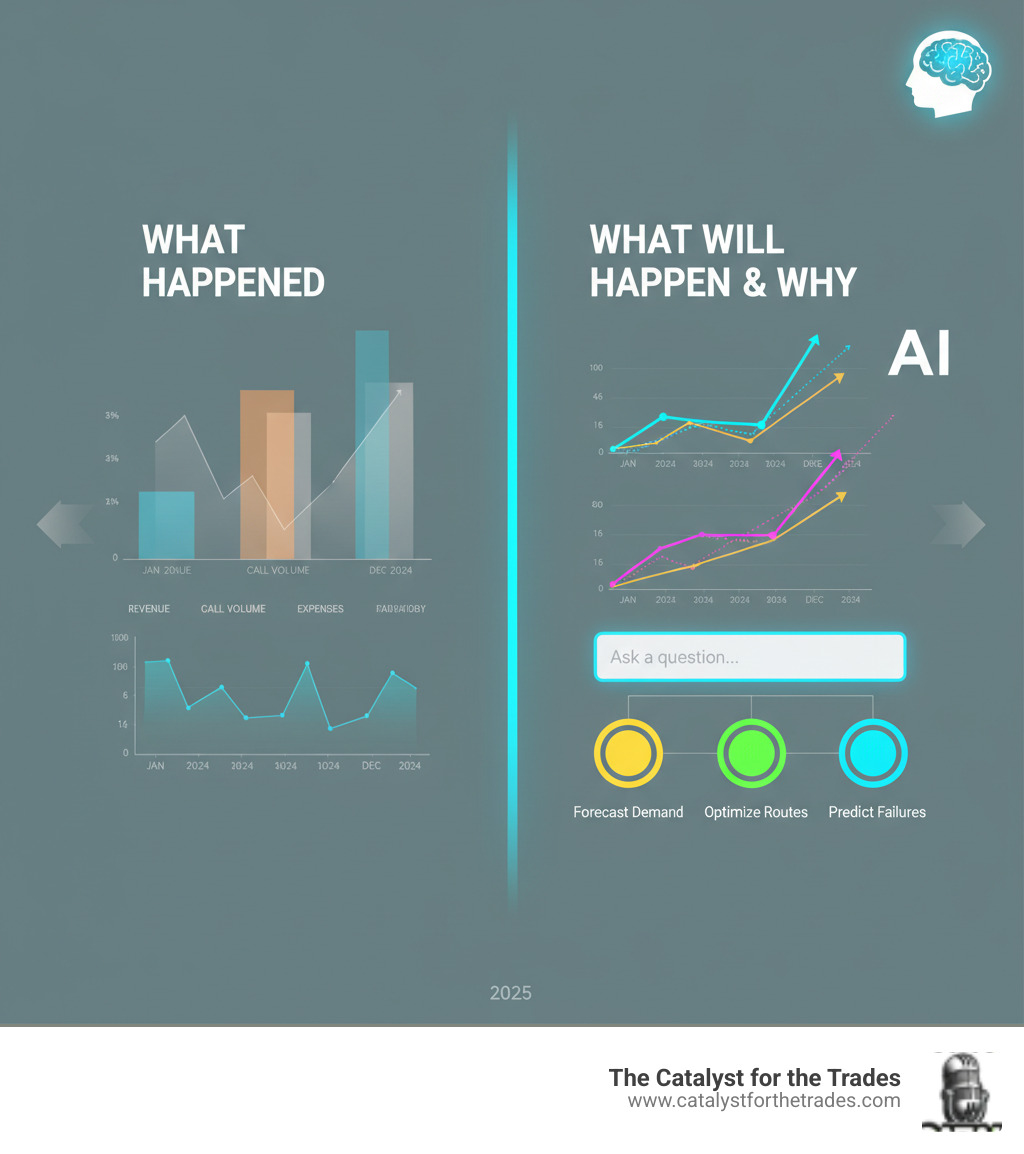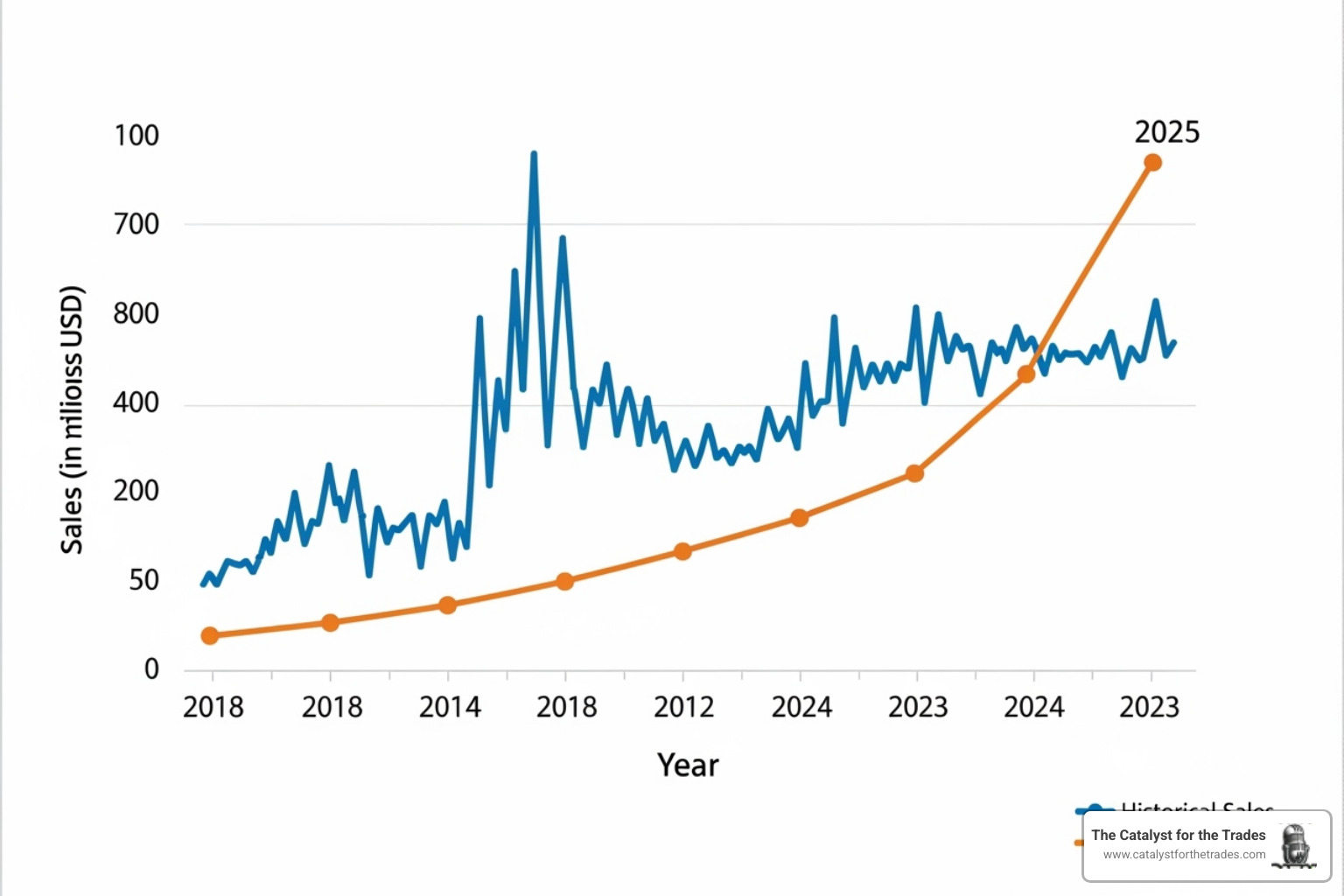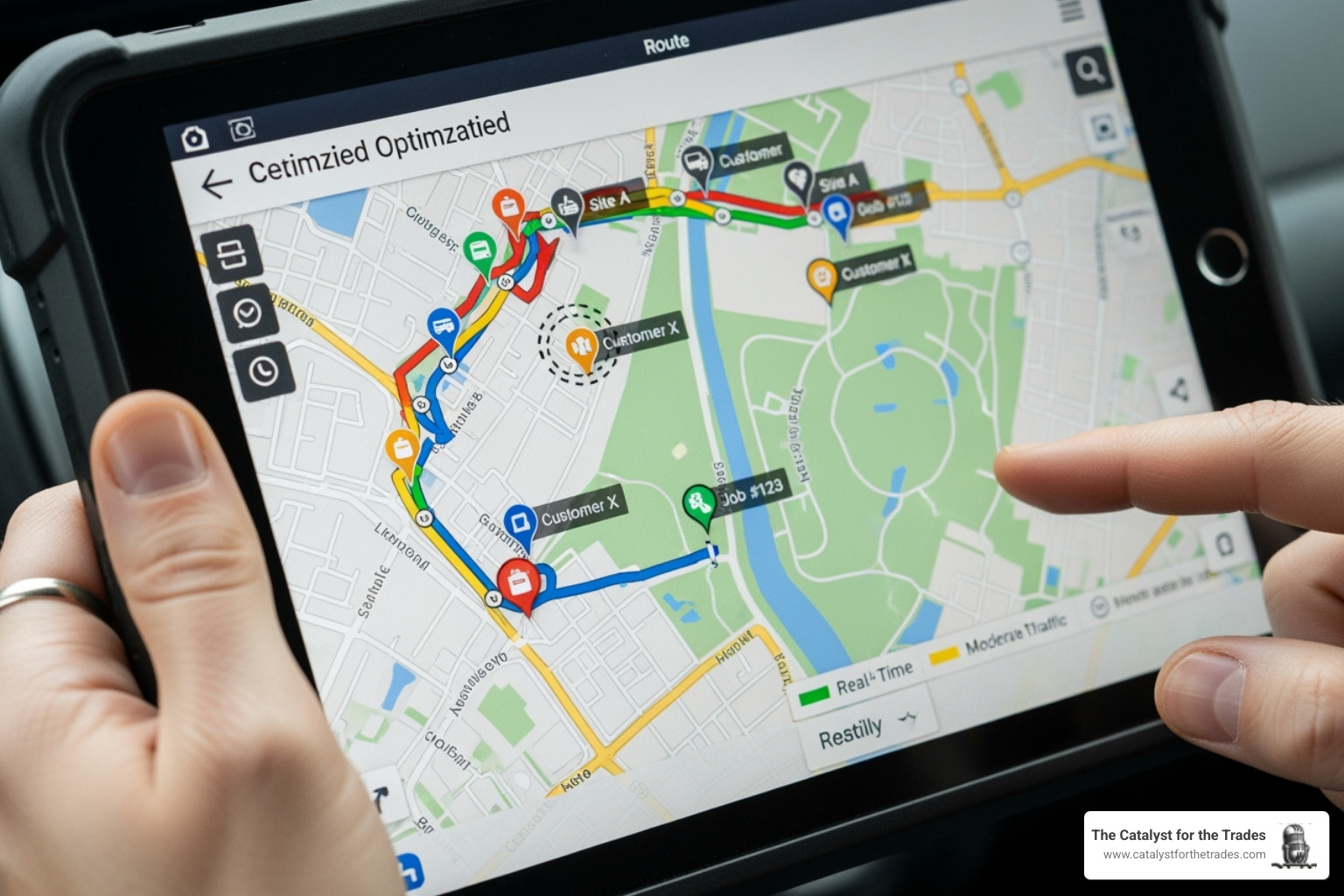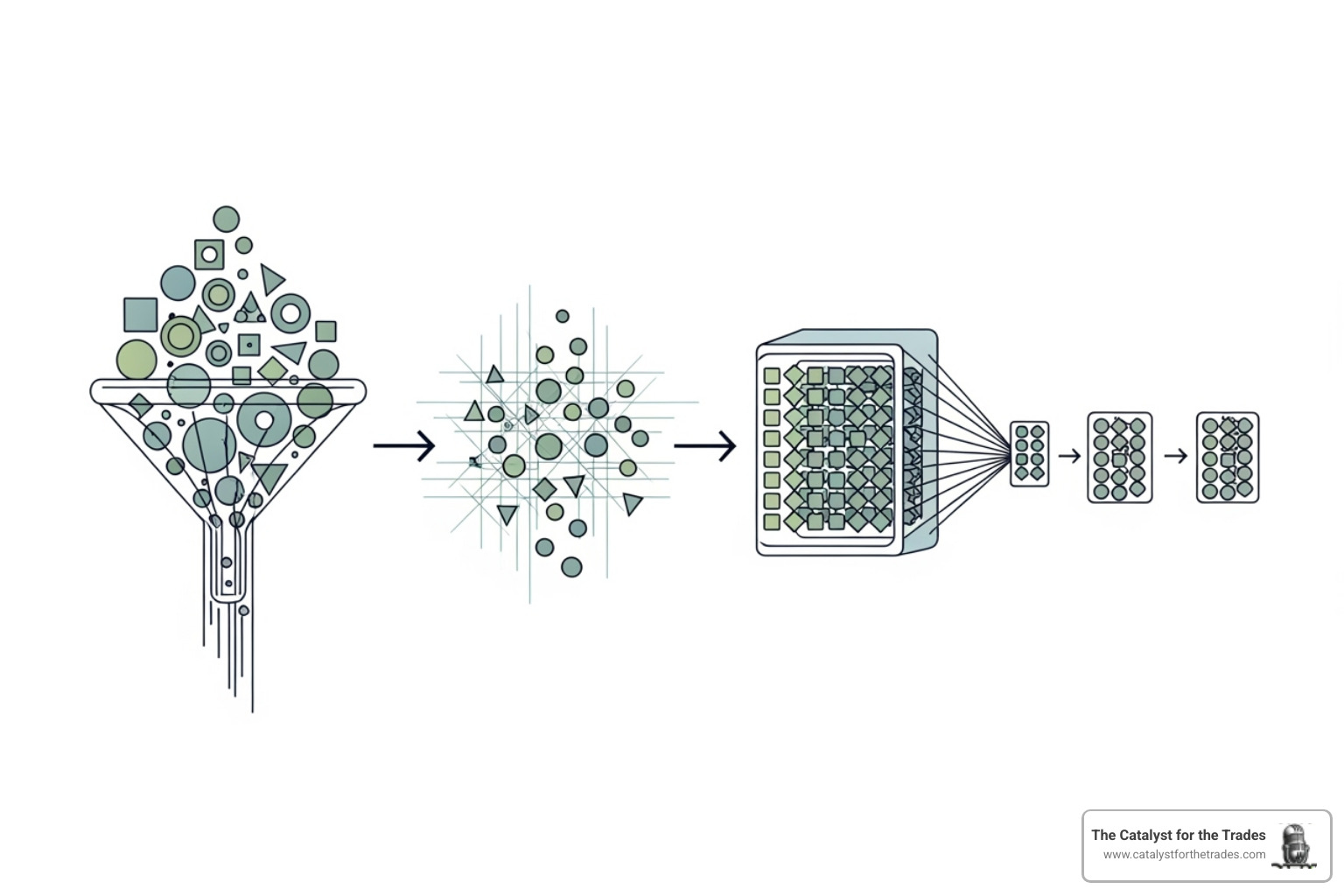Discover business acumen: core components, traits of leaders, development steps & metrics to boost decision-making and scale success.

Beyond the Buzz: AI's Real Impact on Business Intelligence and Operations
Why AI Business Intelligence is Changing Home Services
AI business intelligence combines artificial intelligence with data analysis to help businesses make smarter, faster decisions. Instead of just showing past events, AI-powered BI predicts what will happen next and explains why, turning data into a tool for better planning.
Key benefits of AI business intelligence:
- Predictive insights - Forecast customer demand, equipment failures, and seasonal trends
- Automated analysis - AI processes data 24/7, spotting patterns humans might miss
- Natural language queries - Ask questions in plain English, get instant answers
- Real-time decision making - React to changes as they happen, not weeks later
- Self-service analytics - Your team gets answers without waiting for IT experts
Traditional business intelligence was like looking in a rearview mirror—useful for understanding the past, but not for planning ahead. AI changes this, acting more like a GPS for your business. It doesn't just show where you've been; it predicts traffic, suggests better routes, and warns you about problems before they happen.
This shift from hindsight to foresight is especially powerful for home services. Whether you run HVAC, plumbing, or electrical operations, AI-powered BI can predict service needs, optimize technician routes, and forecast equipment failures. Best of all, modern tools let anyone ask questions in everyday language and get actionable answers instantly.

From Hindsight to Foresight: How AI Improves Traditional Business Intelligence
Traditional BI meant analyzing last month's reports—a rearview mirror approach. You learned that July was busy or that a neighborhood needed more AC repairs. Useful, but reactive.
AI business intelligence shifts this from hindsight to foresight. It's like upgrading to a GPS that shows traffic ahead and suggests better routes. Instead of just descriptive analytics (what happened), AI delivers predictive analytics. It tells you which customers will likely book service next month or when a technician might need a break.
This is possible through automated data analysis. AI crunches customer calls, service records, and seasonal patterns 24/7, spotting trends humans might miss. You get real-time insights instead of waiting for monthly reports, such as a spike in emergency calls in a specific area. This proactive approach leads to increased operational efficiency and faster decision-making. For real-world examples, see our post on How Decision Intelligence and AI Are Helping Contractors Make Smarter, Faster Choices.

The Key Benefits of Integrating AI into BI
Integrating AI fundamentally changes how you operate. The biggest game-changer is empowering self-service, where anyone on your team can get answers without waiting for IT. This removes bottlenecks and speeds up decisions. AI also delivers deeper insights by analyzing both structured data (invoices) and unstructured data (customer reviews), giving you a 360-degree view of your business.
This enables proactive strategies, like staffing up before a busy season instead of scrambling during it. AI ensures improved accuracy in analysis and gives you a competitive advantage by allowing you to adapt faster. Finally, it enables smart resource allocation, putting your technicians, inventory, and marketing dollars where they'll have the biggest impact.
Democratizing Data: How AI Enables Self-Service Analytics
In the past, a simple business question like "Which neighborhoods had the most plumbing emergencies last month?" meant waiting for an IT report. AI business intelligence ends this delay.
Now, anyone can use conversational queries in plain English to get instant answers. This natural language interaction feels magical. An office manager can type "Show me our highest-revenue customers" and get a clear, visual answer. This reduces reliance on data experts and empowers your entire team. Modern user-friendly dashboards don't just show numbers; they create visual stories and explain what trends mean, providing actionable answers for non-technical users. For more details, explore more on AI-powered self-service analytics.
The Engine Room: Key AI Technologies Driving Modern BI
Think of AI business intelligence as a high-performance engine. You don't need to know every detail, but understanding the core components helps you appreciate its power. Three key AI technologies transform your raw data into actionable insights.

Machine Learning is the prediction engine, learning from historical data to forecast the future. Natural Language Processing is the translator, letting you ask questions in plain English. Generative AI acts as your analyst, creating reports and spotting insights. Together, they provide clear answers in seconds.
Machine Learning (ML) and Predictive Analytics
Machine Learning (ML) digs into your historical data to predict what's next. For home service contractors, this means serious competitive advantages. Forecasting future trends and demand prediction take the guesswork out of staffing and inventory. Your ML system can tell you how many technicians you'll need for the busy season and which parts to stock.
Anomaly detection acts as an early warning system, spotting unusual patterns that might indicate equipment problems or customer satisfaction issues. ML also excels at identifying opportunities, like which clients are ready for an upgrade or which service areas are ripe for expansion. This leads to incredibly precise inventory management, minimizing stockouts and reducing carrying costs. To dive deeper, check out more on predictive analytics.
Natural Language Processing (NLP) for Conversational Insights
Gone are the days of waiting for IT to run a report. Natural Language Processing (NLP) lets you talk to your data. You can ask questions in plain English, like "Which technician has the highest customer satisfaction scores?" and get an instant answer.
NLP is also powerful for sentiment analysis from customer reviews, automatically processing feedback to gauge customer feelings. This ability to understand unstructured data—like technician notes and call transcripts—is a game-changer. NLP can even generate data narratives, writing clear summaries that explain trends and turn complex data into simple stories. Learn more in our post on How AI, Voice, and Chat Are Changing the Home Service Game.
Generative AI and Augmented Analytics
Generative AI is the newest player in AI business intelligence, acting like a brilliant analyst who never sleeps. It provides automated report summaries, condensing lengthy reports into clear, concise highlights and suggesting actions.
It also shines at crafting data stories, writing compelling narratives that explain what your data means for your business. The co-pilot for analysis feature feels like having a data scientist beside you, suggesting relevant information and analysis paths. Perhaps most exciting are the proactive nudges and recommendations. Generative AI actively monitors your data and alerts you to opportunities or issues, like a sudden increase in call volume. To understand the technology, explore understanding large language models.
Putting AI to Work: Practical Use Cases in Home Services
You might wonder if AI business intelligence is really for your home service business. The answer is yes. AI is becoming a powerful tool for trades businesses to work smarter, serve customers better, and boost their bottom line.

AI tackles daily challenges like juggling schedules, managing inventory, and tracking marketing ROI by turning scattered data into clear insights. It creates a complete customer picture by connecting data from calls, service history, and reviews. This allows for laser-focused marketing, data-driven sales forecasting, and smoother operational processes.
Improving Sales and Lead Management
AI business intelligence helps you spot at-risk customers before they leave by analyzing service history and payment patterns. This early warning system allows you to proactively retain them. AI also identifies upsell opportunities at the right moment, such as suggesting a water filtration system to a customer calling about an aging water heater.
By scoring leads based on their likelihood to convert, AI helps your team prioritize high-value prospects. It can also automate follow-ups with personalized emails and reminders, ensuring no lead falls through the cracks. See how it's working for businesses just like yours in From Comedy to AI: How Sebastian Jimenez is Revolutionizing Sales in the Trades.
Optimizing Field Operations and Supply Chain
Technicians spend too much time driving. AI business intelligence creates optimal routes considering traffic, job complexity, and technician skills. This means more jobs per day, less fuel used, and happier techs.
Predictive maintenance scheduling uses data to predict when equipment will fail, allowing you to perform profitable planned maintenance instead of reactive emergency repairs. For inventory, AI analyzes service history and seasonal trends to forecast exactly what parts you'll need, finding the sweet spot between too much and too little stock. It also flags anomalies, like a spike in fuel costs for a certain route, so you can investigate quickly. Learn more about how technology is changing field operations in How AI and Digital Tools Are Changing the Way Home Services Sell.
Enhancing Customer Experience and Marketing
AI processes thousands of customer comments, reviews, and call transcripts in minutes, identifying themes and sentiment trends. This helps you quickly address problems and replicate successes.
Your marketing becomes hyper-targeted. Instead of generic mailers, you can send personalized offers based on a customer's service history and predicted needs. Predicting customer needs before they arise creates amazing service opportunities, like proactively offering an inspection for an aging furnace model.
Your call center becomes more efficient too. When customers call, AI-powered tools can instantly pull up their complete service history, suggest solutions based on their specific situation, and even help agents handle routine questions more quickly and consistently.
Navigating the Problems: Challenges of Implementing AI Business Intelligence
Implementing AI business intelligence has its challenges, but they are manageable with the right approach. The key is to start with clarity: identify which decisions need improvement, then find the right technology.

A smart implementation strategy means choosing tools that fit your business and integrating them gradually. Watch out for common pitfalls like poor data quality or unrealistic expectations. Most importantly, change management is critical. AI changes how people work, which requires clear communication, training, and support.
The Foundation: Data Quality and Governance
Here's the uncomfortable truth: most business data is a mess. And when you feed messy data into AI, you get messy results. It's the classic "garbage in, garbage out" problem, and it's the biggest roadblock to successful AI business intelligence.
Research shows that only 4% of IT leaders believe their data is ready for AI. This means 96% of businesses are sitting on data that needs serious work before AI can help them make better decisions.
Data silos are a major issue in home services, with customer, scheduling, and accounting data stored in disconnected systems. AI needs a complete picture to find patterns. Data cleaning and preparation is the heavy lifting, and establishing data stewardship—deciding who is responsible for data accuracy—is essential. You must ensure data accuracy and trust. If your team doesn't trust the numbers, they won't trust the AI. For more detailed guidance, check out How data governance and data quality work together.
The Human Element: Skills Gap and Ethical Considerations
Technology is only half the equation. The other half is people - and that's where many AI business intelligence implementations hit unexpected bumps. The human side brings both exciting opportunities and serious responsibilities that can't be ignored.
Upskilling the workforce is essential, but it's not as scary as it sounds. While AI makes data more accessible, your team needs to learn how to work with these new tools effectively. Forbes research reveals that 75% of companies are adopting AI, but only 35% of employees have received AI training in the past year. That gap creates real problems when people don't know how to interpret AI insights or ask the right questions.
The "black box" problem is when AI systems are so complex that even their creators can't explain exactly how they reached a conclusion. Be wary of AI bias, where systems learn from flawed historical data and then perpetuate those problems. Data privacy and security become more complex with AI because these systems often need access to large amounts of sensitive information. You need robust security controls and strict adherence to privacy regulations.
Fostering a data-driven culture requires more than just installing new software. You need to overcome natural resistance to change, build trust in new tools, and celebrate wins when data leads to better outcomes. The businesses that succeed with AI are those that invest in their people alongside their technology. Want to stay ahead of these challenges? Learn more in How to Stay Competitive as AI and Consumer Behavior Reshape Home Services.
The Future is Now: The Evolving Role of Professionals and ai business intelligence
The rise of AI business intelligence isn't about replacing humans; it's about augmenting our intelligence. Our role is shifting from wrestling with spreadsheets to focusing on what humans do best: strategic thinking, asking the right questions, and turning insights into action.
This happens through agentic analytics, where AI agents work alongside us as digital teammates. They analyze data 24/7, but still need us for context and final decisions. This human-in-the-loop approach is collaborative: AI handles the data processing, while we bring creativity and business knowledge. As AI automates routine tasks, we focus on strategic thinking over technical tasks. This shift requires continuous learning from everyone, as both AI and our teams must adapt and improve.
The Shifting Skillset for BI Professionals
The role of the BI professional is evolving. The new landscape of AI business intelligence demands a blend of technical understanding, business sense, and people skills.
Data storytelling is a new superpower—weaving insights into narratives that drive action. Critical thinking is more valuable than ever for validating and interpreting AI findings. Strong business acumen helps guide AI tools effectively within the context of the home service industry. The art of asking the right questions has become crucial, as the quality of conversational AI's answers depends on the quality of our queries. Finally, interpreting AI-generated insights requires human wisdom to connect data to real-world operations. For insights on adapting to these industry changes, check out Future-Proofing Contracting: Paul Redman on Tech, AI, and the New Customer Experience.
What's Next for ai business intelligence?
The evolution of AI business intelligence is accelerating. Hyper-personalization is coming fast. Soon, AI won't just segment customers into broad categories – it'll deliver insights custom to individual customers and even individual employees. Picture a technician getting real-time, AI-powered suggestions for the perfect upsell opportunity based on the specific customer's history and the current job details.
Autonomous decision-making will handle more routine choices without constant human oversight. AI might automatically reorder inventory when supplies run low or adjust marketing spending based on real-time performance. We'll still oversee the big decisions, but AI will handle the day-to-day operational adjustments.
Deeper integration into business apps means AI won't live in separate dashboards anymore. It'll be woven directly into your CRM and dispatch software, offering smart suggestions right where you're already working. More sophisticated AI agents will emerge, handling increasingly complex requests and learning from your feedback to become more helpful over time. The future of AI business intelligence is one where data actively drives better decisions at every level.
Conclusion
AI business intelligence is not just another tech trend; it's a fundamental shift in how we run our businesses. We've seen how AI transforms traditional BI from a rearview mirror into a GPS, predicting what's next and showing us how to prepare.
The technologies behind this—machine learning, natural language processing, and generative AI—make it simple for anyone on your team to ask questions and get smart answers instantly. For the trades, this means tangible benefits: predicting customer needs, optimizing technician routes, and making every customer interaction more valuable.
While challenges like data quality and the need for new skills exist, they are manageable. Most importantly, AI isn't replacing human intelligence; it's amplifying it. Our teams are becoming more strategic, insightful, and effective.
The future of hyper-personalization and autonomous decision-making is already happening in forward-thinking home service businesses. AI business intelligence has become a must-have for staying competitive. The companies embracing these tools today will lead their markets tomorrow.
At The Catalyst for the Trades, we're passionate about helping you steer this change. The revolution is underway. The question isn't if AI will transform our industry, but whether you'll be leading the charge. To start your journey, dive deeper into The AI Revolution in Home Services: How to Future-Proof Your Trades Business.

Discover how leading home‑service companies are leveraging AI, subscription models, and digital‑first strategies.
Learn why private equity, automation, and customer‑centric tech are reshaping the trades.
Episodes you may like


Lead your crew to victory! Master essential contractor leadership strategies for project success, safety, and team empowerment.

Harness real-time data with cortex pulse analytics. Get AI-driven insights, detect issues instantly, and make smarter business decisions.
.png)



